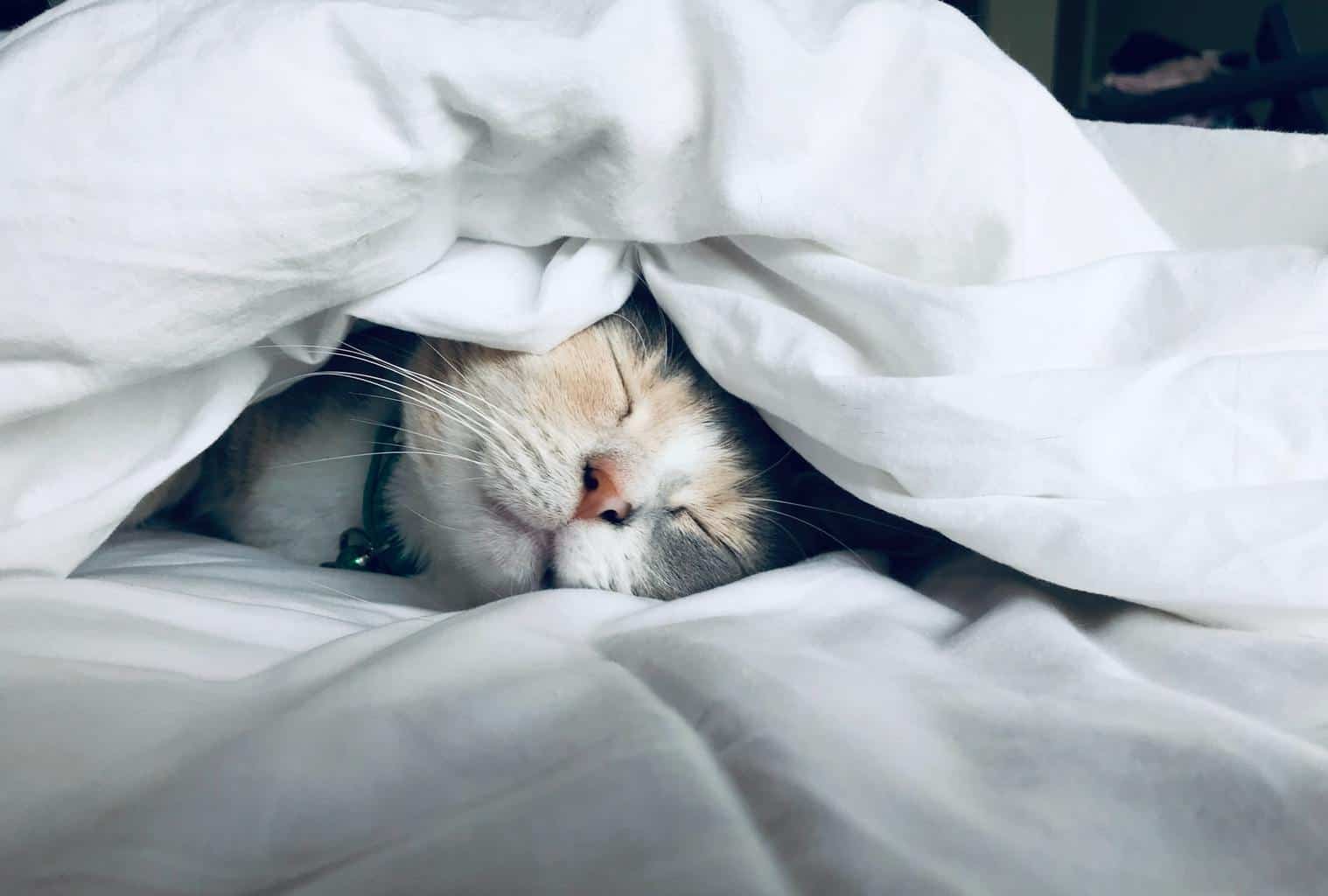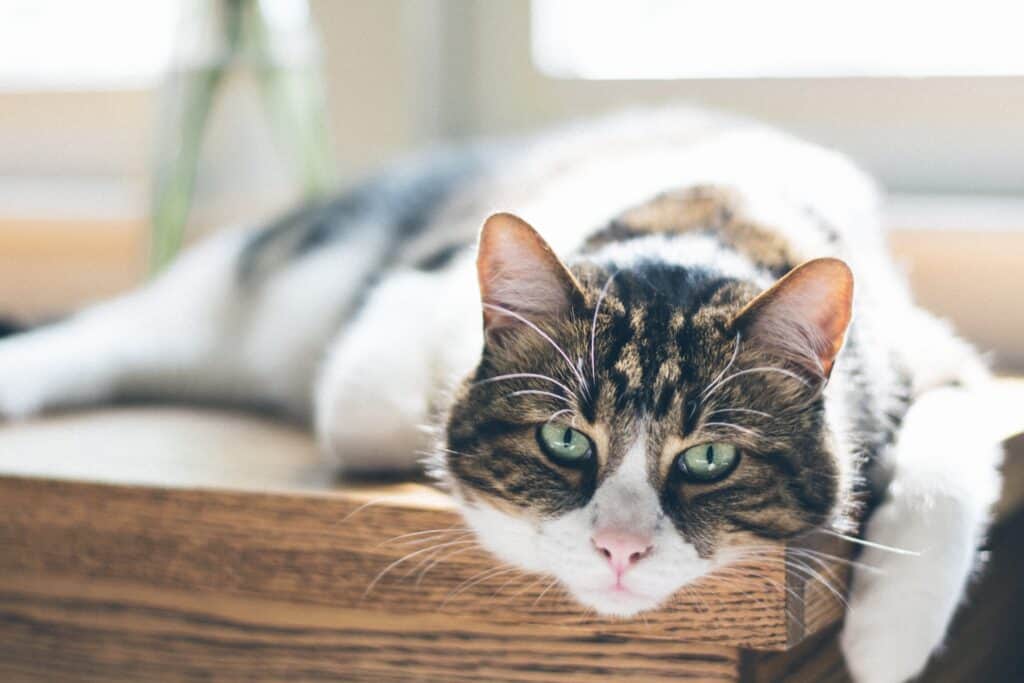What’s better than sleeping together with your cat, sharing the same bed and blankets? Most cats enjoy snuggling up to us at night, and many want to sleep under the covers with us.
As a cat parent myself, I’ve been worried about whether it is safe for my cat to go under the covers with me.
More than once, I’ve asked myself if cats can breathe. Will she not suffocate due to a lack of oxygen?
So, I did the research and asked my vet about it. She also confirmed that;
Is it safe for cats to sleep under blankets?
It is perfectly safe for adult cats to sleep under blankets. Blankets permeate enough oxygen, so there is no risk of them suffocating. They will get out by themselves when it becomes uncomfortable or too hot. It is harder for young kittens to find their way from underneath the blanket, so it’s best not to let them sleep under the blankets.
Can kittens suffocate under blankets?
Adult cats suffocating under ordinary blankets is impossible because most cover fabrics are breathable and porous.
Because of this, there is plenty of oxygen available to breathe. If your cat becomes uncomfortable or too warm, they will come out from under the covers themselves.
However, for kittens, it is a different story. Kittens do not yet have the self-preservation and survival instinct of adult cats. Because they cannot move around and get to safety quickly, it’s best not to let them sleep under the covers to avoid the risk of suffocation.
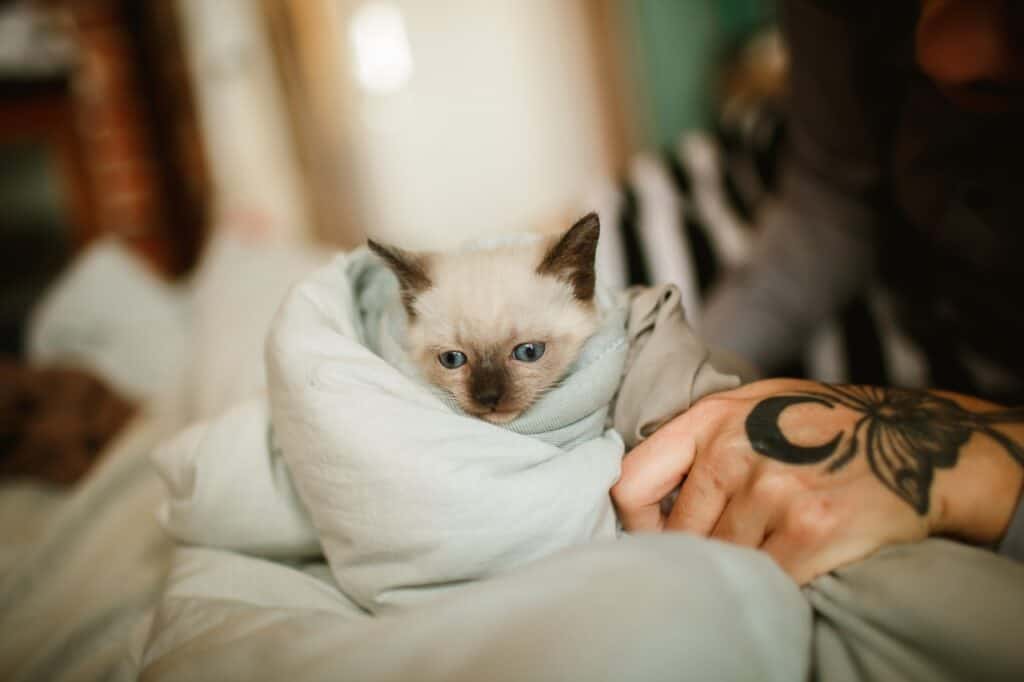
How do cats breathe under the covers?
Sleeping with our heads under the covers is uncomfortable for most of us because it gives us the impression that we’re not getting any fresh air.
This is because the air under the blankets is too warm, not because there isn’t enough oxygen to breathe.
Adult cats can easily breathe, even under the covers, because their lungs are much smaller than ours. Because of this, cats breathe less air with a single breath than humans do. Therefore it is very unlikely they run out of oxygen under the covers.
Unless your blanket situation is very unusual and you’re using a weighty type of blanket or a particular type of air-tight blanket, air and oxygen will permeate through, enabling you and your cat to breathe normally.
Can cats overheat under blankets?
It’s well known that cats adore heat and love to curl up and sleep in warm places. However, you might think being wrapped up under a pile of blankets without fresh air may be too much for even a cat.
For who is worrying about a cat overheating under a blanket, I can set your mind at ease;
The risk of cats overheating when sleeping under blankets or covers is minimal. This is because a cat’s body temperature is higher than ours (between 100.5°F and 102.5°F (38.1°C and 39.2°C)), they are less bothered by the fact that the air under our blankets is warmer.
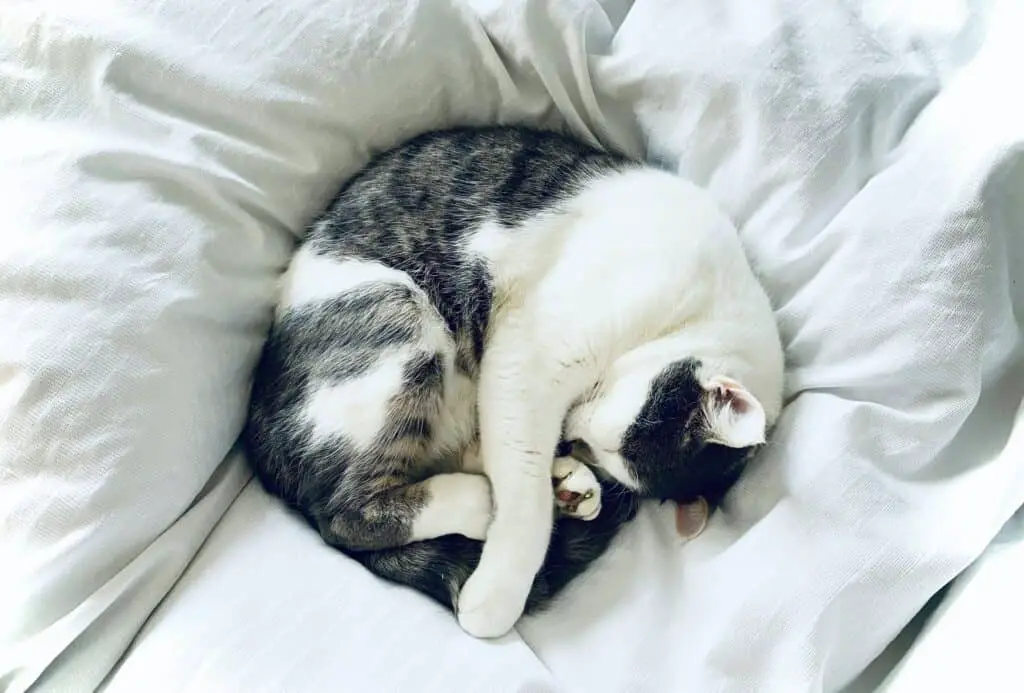
Why Do cats like being under the covers?
Safety, warmth, and comfort are why cats like cuddling under blankets.
Especially in the cold winter months when your cat might get cold, you’ll find that cats like snuggling under the blankets with you.
Cats are well-known for their love of warm and hidden places. Blankets provide a perfect warm hiding spot that is ideal for cats to take a nap.
The softness of the blankets soothes them, and as a bonus, they get to spend quality time with you.
Especially with their owners or people they trust and are friendly with, cats can be very affectionate. When she wants to sleep with you and even under the blanket with you, it means she trusts you and wants to cuddle.
Other reasons cats like digging into the blankets and sleeping with you are:
- Relaxation, feeling safe and hidden.
- Staying warm by sharing body heat – especially older cats may have trouble keeping themselves warm at night.
- Stress relief
- Getting some social time, strengthening the mutual bond between both of you
- Falling asleep faster
Why do cats hide or “burrow” themselves under the covers?
Besides sleep under the covers, your bed is an ideal playground for cats. Cats love to play hide-and-seek, even if it’s only by themselves and chase imaginary prey.
Cats enjoy burrowing themselves under blankets, or sometimes even under you, because of their strong denning instincts. It is their way of creating a safe and secluded ‘den’ for themselves.
Although domesticated, a cat’s instincts remain strong. In the wilderness, they are both prey and predators. When playing under our sheets, they can enact those instincts.
If they are the prey, hiding under blankets or covers will give them a safe and secure hiding place.
When they are the predator, the sheets will provide an obscured spot. Ideal to wait for the right moment to pounce upon their prey.
Those denning instincts are also why cats like to sleep or hide under the bed or under other furniture.
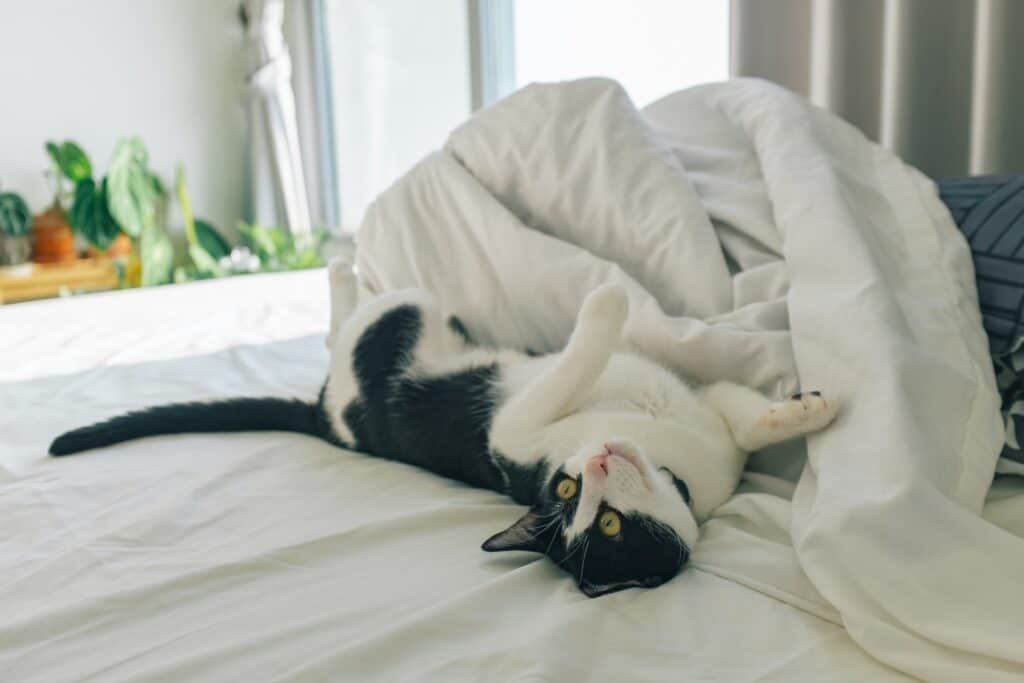
drawbacks of Sleeping with your cat
As mentioned, it is perfectly safe to let your cat sleep under the covers with you. If you’re using standard blankets, there should be no oxygen concern.
Because cats have highly developed self-preservation instincts, them smothering while under the sheets is very unlikely, they will wake up and get out if they’re experiencing any discomfort.
Apart from a potential safety concern, there are other things to consider, and it basically comes down to your personal choice The disadvantages include;
Disrupted sleep
Cats are crepuscular animals, meaning they are more active at night than during the day.
Although they find it cozy and warm to join you under the blankets, most cats will not sleep with you the entire time and move around during your sleep.
Especially younger cats love to play and hunt during the night. This might wake you up if you’re a light sleeper.
Asthma and allergies
If you’re a person who’s prone to allergies, having a cat sleep in your bed and even under the sheets could exacerbate your allergies.
This is caused by dander, skin flakes, cat saliva, and other causes of allergies finding their way into your bed.
Exposure to infections and parasites
Especially if you have a cat that goes outside, you could bring unwanted things into your bed, such as parasites or bugs.
The risk is probably small because cats are quite clean, but it’s worth considering. If it’s not to stop the creepy crawlers, your cat can have dirty paws and deposit sand and dirt into your clean bed.
Introduction to litter box debris
Cats may have remnants of their litter box or other debris in between their paws which they can deposit on your bed.
On the other hand, most of these drawbacks can be avoided or minimized by ensuring your cat is clean. It’s a good practice to clean your cat’s paws before they join you in your bed.
How to avoid your cat from sleeping with you?
If for any reason, you prefer to sleep without your cat, there are some ways to train your cat that your bed is off-limits for them.
How to do this:
- Keeping your bedroom door closed – Keeping the door closed, both during the day and night, will send a clear signal that this room is off-limits. When starting with this, your cat may scratch the door for a few nights but will learn soon enough that she’s not allowed in.
- Using a scent that cats dislike – There are several smells that cats hate but are pleasant to us. For example, using eucalyptus on your sheets will give you a fresh sensation while your cat will hate it and stay away.
- Provide a good alternative sleeping place – If you don’t want your cat to sleep in bed with you, do provide a warm, soft, and cozy alternative for her. When having a nice cat bed, your cat will prefer oversleeping in your bed.
- Be consistent – With any pet, consistency is the key to teaching them something. If you let your cat sleep with you from time to time but disallow it other times, it will confuse her.
Related Questions
Can cats hide under pillows?
Cats often sit, hide and sleep under pillows. They do this because they like the warmth, providing a good hiding place for them.
What is the meaning of some cat sleeping positions?
Cats can sometimes sleep in positions that seem strange or uncomfortable to us. Although all cats are different, how they sleep reveals a lot about their personality or how they feel. Read more about cat sleeping positions in our post here.
How can I make sure my cat is safe while sleeping with me?
Your cat’s self-preservation instinct is enough to ensure her safety while sleeping with you. If your cat feels threatened by your presence in the bed or when you toss and turn too much, she will leave the bed and head to her own bed or a furniture piece she likes.
Love Cats?
Then you will enjoy our other content as well. Have a look at these popular articles on our website.
-

10 Ways to Make Your Cat Live Longer
The oldest cat to ever live passed away at the old age of 38. On average, household cats live between […]
-

12 Reasons Why Siamese Cats Cry at Night
Siamese cats are a popular breed of cats that many people choose to have as pets. Perhaps you have heard […]
-
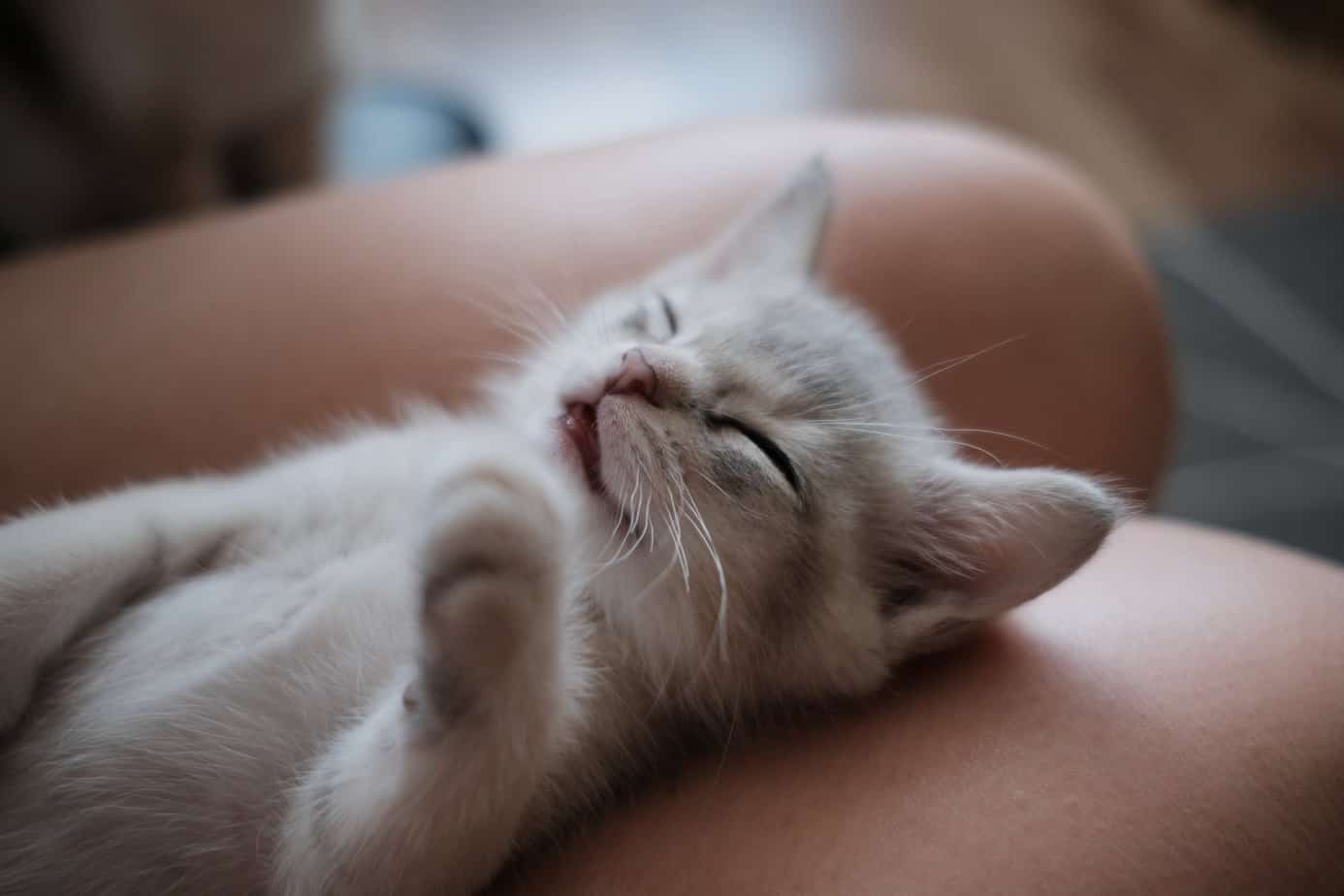
15 Incredible Ways That Cats Show Affection For Humans
Wondering how cats show their affection for humans? We have listed several incredible ways that cats are trying to show their love for us.

